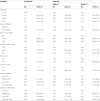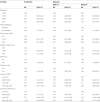4. Won YS, Park KH, Kim IW. Hotel Management. 2011. Seoul: Daewang Pub Seoul.
5. Lee SH. A Study on the job Stress of Hotel Employees: Focused on the Deluxe Hotel in Seoul. Unpublished Doctoral Dissertation. 2002. Seoul: Kyonggi Univ Seoul.
6. Ha HJ, Han KS. Research on fatigue ratio about hotelier working cooking field according to duty of rotation. J Food Manage Soc Korea. 2007; 10(2):181–202.
7. Chyuan JA, Du CL, Eh WY, Li CY. Musculoskeletal disorders in hotel restaurant workers. Occup Med. 2004; 54(1):55–57. DOI:
10.1093/occmed/kqg108.
9. Ministry of Employment and Labor:
Survey on working hours (translated by LEE JJ). [
http://www.moel.go.kr/].
10. Dimeo FC. Effects of exercise on cancer-related fatigue. Am Cancer Soc. 2001; 92(6):1689–1693.
11. Kim SH, Yun GS. A study on the stress and fatigue of research workers. Korean J Occup Environ Med. 1998; 10(1):105–115.
12. Kant IJ, Bultmann U, Schroer KAP, Beurskens AJHM, van Amelsuoort LGPM, Swaen GMH. An epidemiological approach to study fatigue in the working population: the Maastricht Cohort Study. Occup Environ Med. 2003; 60(Suppl 1):32–39. DOI:
10.1136/oem.60.suppl_1.i32.
13. Van Amelsvoort IG, Kant U, Beurskens AJ, Schröer CAP, Swaen CMH. Fatigue as a predictor of disability. Occup Environ Med. 2002; 59:712–713. DOI:
10.1136/oem.59.10.712. PMID:
12356934.
14. Weijiman I, Ros WJG, Rutten GEHM, Schaufeli WB, Schabracq MJ, Winnubst JAM. Fatigue in employees with diabetes: its relation with work characteristics and diabetes related burden. Occup Environ Med. 2003; 60:93–98. DOI:
10.1136/oem.60.suppl_1.i93.
16. Lawrie SM, Manders DN, Geddes JR, Pelosi AJ. A population-based incidence study of chronic fatigue. Psychol Med. 1997; 27:343–353. DOI:
10.1017/S0033291796004357. PMID:
9089827.
17. Yoshitake H. Three characteristic patterns of subjective fatigue symptoms. Ergonomics. 1978; 21:231–233. DOI:
10.1080/00140137808931718. PMID:
27351.
18. Bultmann U, Kant IJ, van Amelsvoort LG, van den Brandt PA, Kant S, van denKals SV. Differences in fatigue and psychological distress across occupations: results from the Maastricht Cohort Study of fatigue at work. J Occup Environ Med. 2001; 43(11):976–983. DOI:
10.1097/00043764-200111000-00008. PMID:
11725338.
19. Chang SJ, Koh SB, Kang MG, Hyun SJ, Cha BS, Park JK, Park JH, Kim SA, Kang DM, Chang SS, Lee KJ, Ha EH, Ha MN, Woo JM, Cho JJ, Kim HS, Park JS. Correlates of self-rated fatigue in Korean employees. Korean J Prev Med. 2005; 38(1):71–81.
20. Hochschild AR. The Managed Heart: Commercialization of Human Feeling. 1983. Berkeley: University of California Press.
21. Morris JA, Feldman DC. The dimensions, antecedents and consequences of emotional labor. Acad Manage Rev. 1996; 21:986–1010.
22. Kim HJ. Occupational diseases produced by emotional labor. Hanyang Med Rev. 2010; 30(4):284–289. DOI:
10.7599/hmr.2010.30.4.284.
23. Zapf D, Holz M. On the positive and negative effects of emotion work in organizations. Eur J Work Org Psyc. 2006; 15(1):1–28. DOI:
10.1080/13594320500412199.
25. Ahn JY, Jung HS, Kim HA. The relationship between emotional labor and job stress of clinical nurses in a hospital. Korean J Occup Health Nurs. 2007; 16(2):139–146.
26. Brotheridge CM, Grandy AA. Emotional labor and burnout: comparing two perspectives of "People Work". J Vocat Behav. 2002; 60:17–39. DOI:
10.1006/jvbe.2001.1815.
27. Ashforth B, Humphrey RH. Emotional labor in service roles: the influence of identity. Acad Manage Rev. 1993; 18:88–155.
28. Kim SY, Chang SJ, Kim HR, Roh JH. A study on the relationship between emotional labor and depressive symptoms among Korean industrial service employees. Korean J Occup Environ Med. 2002; 14:227–235.
29. Shin MK, Kang HI. Effects of emotional labor and occupational stress on somatization in nurses. J Korean Acad Nurs Admin. 2011; 17(2):158–167. DOI:
10.11111/jkana.2011.17.2.158.
30. Yoo SK, Choi CK, Song HS, Lee CG. Relationship between occupational stress-emotional labor and musculoskeletal symptoms and experience of absence or early leave in some civil affairs officials. Korean J Occup Environ Med. 2011; 23(2):192–202.
31. Expert Consultation WHO. Appropriate body-mass index for Asian populations and its implications for policy and intervention strategies. Lancet. 2004; 363(9403):157–163. DOI:
10.1016/S0140-6736(03)15268-3. PMID:
14726171.
32. Chang SJ. Standardization of Collection and Measurement of Health Statistics Data. 2000. Seoul: Gyechook Press Seoul;p. 144–181.
33. Ahn JY, Jeon ES, Kim H. Effect of job satisfaction and organization behavior from emotional labour. Tour Sci Soc of Korea. 2007; 7:3–19.
34. Abraham R. The impact of emotional dissonance on organizational commitment and intention to turnover. J Psychol. 1999; 133(4):441–455. DOI:
10.1080/00223989909599754. PMID:
10412221.
35. Chu SH, Ryou H, Bae K, Song J, Lee S, Kim I. Association between emotional labor and symptoms of depression among bankers. Korean J Occup Environ Med. 2010; 22(4):316–323.
36. Lewis G, Wessely S. The epidemiology of fatigue: more questions than answers. J Epidemiol Comm Health. 1992; 46(2):92–97. DOI:
10.1136/jech.46.2.92.
37. Alfredsson L, Akerstedt M, Mattsson M, Wilborg B. Self-reported health and well-being amongst night security guards: a comparison with the working population. Ergonomics. 1991; 34:525–530. DOI:
10.1080/00140139108967334. PMID:
1884708.
38. Briscoe ME. Sex differences in psychological well being. Psyc Med Mono Suppl. 1982; 1:1–46. DOI:
10.1017/S0264180100001673.
39. Koo JW, Lee SH. Industrial fatigue due to banking operations with VDT. J Prev Med Pub Health. 1991; 24(3):305–313.
40. Cho SK, Jung HS. A study on response of job stress and emotional labor of the sales workers of department store. Kor J Occup Health Nurs. 2006; 15:83–93.
41. Kim SG. An exploratory study on the emotional labor in public sector: focused on street-level bureaucrats in the civil service system. Korean J Loc Gov Stud. 2009; 13:51–70.
42. Kruml SM, Geddes D. Exploring the dimensions of emotional labor. Manage Comm Quart. 2000; 14(1):8–49. DOI:
10.1177/0893318900141002.
43. Cho KH, Yang HK, Kim KH, Cho YC. Fatigue symptoms and its related factors among clerical public officers. J Korean Soc Health Educ Promot. 2007; 24(1):29–44.
44. Kim YK, Yoon DY, Kim JI, Chae CH, Hong YS. Effects of health on shift-work. Korean J Occup Environ Med. 2002; 14(3):247–256.
45. Takashi O, Amn K, Tomofumi S, Toshihiro L, Makoto U, Masurmi M, Sadahiko N. Night shift work related problems in young female nurses in Japan. J Occup Health. 2001; 43(3):150–156. DOI:
10.1539/joh.43.150.
46. Son MA. The relationships of working hours and work intensity with sleep disturbance among continuous 12 hours day and night shift workers in an automobile factory in Korea. Korean J Occup Environ Med. 2004; 16(1):13–24.
47. Kim SP, Lee DR. The effects of emotional labor and job context on service employees' psychological well-being. J Hum Resource Manage Res. 2008; 15:79–102.
48. Lee SN. Relations Among Emotional Labor, Burnout, and Job Involvement of Nurses. Unpublished Master's Thesis. 2010. Seoul: Hanyang University.








 PDF
PDF Citation
Citation Print
Print


 XML Download
XML Download